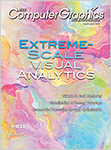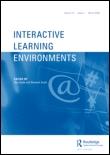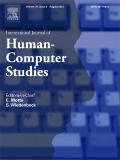
VIRTUAL REALITY
Scope & Guideline
Shaping Tomorrow's Virtual Experiences Today
Introduction
Aims and Scopes
- Interdisciplinary Applications of VR:
The journal publishes research exploring the use of VR in diverse fields such as healthcare, education, psychology, and entertainment, highlighting its potential to enhance learning, therapy, and user engagement. - User Experience and Interaction Design:
A core area of focus is the investigation of user experience (UX) in VR environments, including studies on immersion, presence, and usability, aiming to improve interaction design for various applications. - Technological Innovations:
The journal features advancements in VR technologies, including hardware, software, and methodologies, such as motion tracking, haptic feedback, and augmented reality (AR) integration, contributing to the evolution of immersive systems. - Psychological and Physiological Effects:
Research examining the psychological and physiological responses to VR experiences is prominent, including studies on cybersickness, emotional responses, and cognitive load, providing insights into user well-being. - Educational and Training Applications:
The journal emphasizes the role of VR in education and training, showcasing studies that assess its effectiveness in skill development, knowledge retention, and experiential learning across various disciplines.
Trending and Emerging
- Mental Health and Therapy:
There is a growing interest in the application of VR for mental health interventions, such as exposure therapy for anxiety disorders, PTSD, and stress reduction, reflecting the potential of VR to provide immersive therapeutic experiences. - Education and Training Innovations:
Research on VR's role in education and training is on the rise, particularly studies that assess its effectiveness in enhancing learning outcomes, engagement, and skill acquisition in various disciplines. - Social and Collaborative VR Experiences:
Emerging studies focus on social interactions within VR environments, exploring how collaborative VR experiences can enhance social learning, teamwork, and community building, especially in remote settings. - Ethics and Accessibility in VR:
There is an increasing focus on the ethical implications and accessibility of VR technologies, addressing issues related to user safety, inclusivity, and the psychological impacts of immersive experiences. - Integration of AI and Machine Learning:
The integration of artificial intelligence and machine learning with VR applications is gaining momentum, with research exploring how these technologies can enhance user experiences, personalization, and real-time adaptability.
Declining or Waning
- Traditional Gaming Applications:
Research solely focused on traditional gaming experiences in VR has seen a decrease, as the field expands to include more educational and therapeutic applications that leverage immersive technologies. - Basic VR Hardware Studies:
Papers concentrated on fundamental studies of VR hardware without application context are becoming less frequent, as the focus shifts toward practical implementations and user-centered research. - Generalized User Engagement Studies:
Studies that broadly address user engagement without specific contextual applications are waning, as researchers are increasingly targeting niche areas such as mental health, education, and specialized training. - Standalone VR Experiences:
Research focusing solely on standalone VR experiences, lacking integration with other technologies like AR or mixed reality (MR), is declining as the journal highlights more complex, hybrid applications. - Overly Technical Methodologies:
Papers that prioritize overly technical methodologies without clear practical implications are less common, as the journal favors research that demonstrates real-world applications and user impact.
Similar Journals

ACM Journal on Computing and Cultural Heritage
Innovating Preservation Through Computing.ACM Journal on Computing and Cultural Heritage is a leading scholarly journal published by the Association for Computing Machinery, focusing on the intersection of technology, computing, and the preservation of cultural heritage. Established in 2008, the journal has consistently provided a platform for innovative research that bridges the gap between computational techniques and cultural conservation strategies. With a robust impact factor reflecting its academic rigor and relevance—ranked Q2 in both Computer Graphics and Computer-Aided Design and Computer Science Applications, and Q1 in Conservation—this journal stands out in its ability to foster interdisciplinary collaborations. Notably, it ranks in the top 5% of the Arts and Humanities within its field, highlighting its pivotal role in advancing knowledge and practice in conservation through technology. The journal is vital for researchers, professionals, and students keen on exploring how computing innovations can enhance the safeguarding and interpretation of cultural heritage. Although access options are not distinctly categorized, contributors and readers are invited to engage with the cutting-edge research published through various methods that support scholarly discourse.

IEEE COMPUTER GRAPHICS AND APPLICATIONS
Transforming Ideas into Visual RealityIEEE Computer Graphics and Applications is a premier journal published by the IEEE Computer Society, focusing on the rapidly evolving fields of computer graphics and computer-aided design. With an established history since 1981, this journal has become a vital platform for disseminating innovative research and applications that bridge theory and practice. It is indexed in Scopus, holding a respectable rank of #49 in Computer Graphics and Computer-Aided Design and #250 in Software, reflecting its significant contribution to the academic community with a notable 54th and 38th percentile, respectively. While it currently operates without open access options, the journal continues to provide valuable insights that cater to researchers, professionals, and students alike, striving to push the boundaries of technology and creativity. With plans to converge until 2024, IEEE Computer Graphics and Applications remains committed to fostering advancements in the discipline, making it an essential resource for those at the forefront of computer graphics innovation.

INTERACTIVE LEARNING ENVIRONMENTS
Unveiling the potential of technology in transformative learning experiences.INTERACTIVE LEARNING ENVIRONMENTS, published by Routledge Journals, Taylor & Francis Ltd, is a premier peer-reviewed journal that focuses on the intersection of technology and education, dedicated to advancing the understanding of interactive learning methodologies. With an impressive Q1 ranking in both Computer Science Applications and Education, as well as in E-learning, this journal stands out as an authoritative source of innovative research, ranking 28th in Education and 65th in Computer Science according to Scopus metrics. The journal's comprehensive scope covers a broad range of topics, from the effectiveness of haptic feedback in learning environments to the development of adaptive learning technologies, making it a vital resource for researchers, educators, and policy-makers alike. Although currently not an open-access publication, INTERACTIVE LEARNING ENVIRONMENTS provides readers with substantial insights and empirical findings critical for both theoretical and practical applications in the evolving landscape of educational technology.

INTERNATIONAL JOURNAL OF HUMAN-COMPUTER INTERACTION
Unveiling the Science of User EngagementINTERNATIONAL JOURNAL OF HUMAN-COMPUTER INTERACTION, published by Taylor & Francis Inc, stands at the forefront of research within the interdisciplinary fields of human-computer interaction, human factors, and ergonomics. Since its establishment, the journal has consistently contributed to advancing the understanding of the interactions between people and computers, making it a vital resource for researchers, professionals, and students alike. With an impressive impact factor reflecting its high citation rate, this journal is recognized as a Q1 publication in both Computer Science Applications and Human Factors and Ergonomics categories for 2023, showcasing its stature within the academic community. Additionally, it boasts a commendable ranking within the top percentiles in key areas on Scopus, ensuring that the research published here reaches broad scholarly audiences. Available in traditional subscription format, the journal covers seminal studies from 1989 to 2024, reflecting ongoing innovation in technology and its applications in everyday life, and thus serves as an essential platform for pioneering research that shapes the future of user experience.

INTERNATIONAL JOURNAL OF HUMAN-COMPUTER STUDIES
Bridging the Gap Between Users and MachinesINTERNATIONAL JOURNAL OF HUMAN-COMPUTER STUDIES, published by Academic Press Ltd - Elsevier Science Ltd, stands at the forefront of research dedicated to the dynamic interplay between humans and technology. With a remarkable impact factor reflective of its rigorous academic standards and its prestigious ranking in the Q1 category across vital disciplines such as Education, Engineering, Human Factors and Ergonomics, and Human-Computer Interaction, this journal serves as an essential resource for researchers, professionals, and students alike. Spanning from 1994 to 2024, it showcases pioneering studies that contribute significantly to the understanding of cognitive processes, usability, and the evolving role of technology in society. Despite the absence of Open Access options, access to this journal is facilitated through institutional subscriptions, ensuring that critical findings and advancements are readily available to a global audience. By continuing to publish high-quality research, the INTERNATIONAL JOURNAL OF HUMAN-COMPUTER STUDIES plays a crucial role in advancing the field, fostering innovation, and guiding future research directions.

Computers
Advancing the Frontiers of Computer ScienceComputers is a leading journal published by MDPI, dedicated to advancing research in the fields of computer networks and communications, as well as human-computer interaction. Since its inception in 2012, it has established itself as a vital resource for scholars and practitioners, achieving an impressive Q2 ranking in Computer Networks and Communications and a Q3 ranking in Human-Computer Interaction as of 2023. The journal is indexed in Scopus, highlighting its relevance with a rank of #135/395 and #72/145 in their respective categories. Published in Switzerland, this open-access journal ensures widespread dissemination of research findings, supporting the global academic community in enhancing technologies relevant to computer science. Access options are available, fostering an environment where knowledge is shared freely. With an emphasis on innovation, redesign, and collaboration between humans and technology, Computers plays a crucial role in shaping the future of digital interactions.

Journal on Multimodal User Interfaces
Pioneering Research in Multimodal User EngagementJournal on Multimodal User Interfaces, published by Springer, serves as a vital platform for scholarly exchange in the rapidly evolving fields of Human-Computer Interaction and Signal Processing. Established in 2008 and continuing through 2024, this journal maintains a high profile in academia, currently ranking in the Q2 category for both fields, indicating its significant contribution to ongoing research and practical applications. With its Scopus rankings placing it at #34 in Signal Processing and #49 in Human-Computer Interaction, it is recognized for publishing high-quality, impactful research. Although it is not an Open Access journal, the Journal on Multimodal User Interfaces remains accessible through institutional subscriptions. Researchers, professionals, and students will find the journal an essential resource for advancing knowledge and fostering collaboration in multimodal interaction technologies, which are crucial for enhancing user experience and developing intelligent systems.

ACM Transactions on Applied Perception
Unveiling the Science of Perception through Computational LensesACM Transactions on Applied Perception is a leading journal published by the Association for Computing Machinery, focusing on the intersection of perception science and computational methods. With an ISSN of 1544-3558 and an E-ISSN of 1544-3965, this esteemed publication has been a vital resource for innovators and researchers since its establishment in 2004. It operates within the ambit of Computer Science and the realms of Experimental and Cognitive Psychology, boasting a commendable impact factor and category rankings, including Q2 in Computer Science (miscellaneous) and Q3 in both Experimental and Cognitive Psychology and Theoretical Computer Science. The journal's scope encompasses a plethora of studies aimed at understanding human perception through computational lenses, making it an essential platform for scholarly exchange. Although it does not currently offer an Open Access option, its extensive reach and rigorous peer-review process ensure high visibility and impact in the academic community. By fostering collaboration across disciplines, ACM Transactions on Applied Perception encourages advancements that bridge perceptual research with practical applications, making it invaluable for researchers, professionals, and students engaged in this dynamic field.

Journal of Gaming and Virtual Worlds
Advancing Research in Virtual Reality and Gaming.The Journal of Gaming and Virtual Worlds, published by INTELLECT LTD, serves as a pivotal platform for the exploration and dissemination of research in the rapidly evolving fields of gaming, virtual reality, and digital interactions. With an ISSN of 1757-191X and an E-ISSN of 1757-1928, this journal has established itself as a significant contributor to the landscape of computer graphics, computer science applications, and human-computer interaction within the UK and beyond. Operating from Bristol, England, the journal covers a spectrum of interdisciplinary topics that appeal to researchers, practitioners, and students alike, facilitating an enriched understanding of virtual technological advancements. The journal currently holds a Q3 ranking in both Computer Graphics and Computer-Aided Design and Computer Science Applications, as well as a Q4 ranking in Human-Computer Interaction, reflecting its commitment to high-quality scholarship. As it continues to publish pioneering research up to the year 2024, the Journal of Gaming and Virtual Worlds remains a valuable resource for those looking to stay at the forefront of the gaming and virtual environments domain.

International Journal of Digital Multimedia Broadcasting
Exploring Innovations in Digital CommunicationThe International Journal of Digital Multimedia Broadcasting is a leading scholarly platform dedicated to the interdisciplinary exploration of digital multimedia broadcasting, published by HINDAWI LTD. With an ISSN of 1687-7578 and an E-ISSN of 1687-7586, this Open Access journal has made significant strides since its inception in 2008, ensuring wide accessibility and dissemination of research. Based in the United States, at Adam House, 3rd Flr, 1 Fitzroy Sq, London W1T 5HF, England, the journal covers a range of topics relevant to Communication, Electrical and Electronic Engineering, and Media Technology, boasting impressive Scopus rankings that highlight its influence in these fields. As part of the Q3 category in Communication and Electrical Engineering, and Q2 in Media Technology for 2023, the journal serves a vital role in fostering the understanding of technological advancements and their applications in multimedia broadcasting. Researchers, professionals, and students are encouraged to contribute to and benefit from the journal's rich repository of knowledge, paving the way for innovative developments in this dynamic industry.